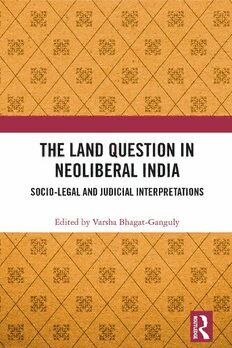
The Land Question in Neoliberal India: Socio-Legal and Judicial Interpretations PDF
Preview The Land Question in Neoliberal India: Socio-Legal and Judicial Interpretations
The Land Question in Neoliberal India This book examines the land question in neoliberal India based on a cohesive framework focusing on socio-legal and judicial interactions in a point of departure from the political-economy approach to land issues. It sheds light on several complex aspects of land matters in India and evolves a critical and multi-dimensional discourse by mapping out exchanges between social and political actors, the State, elites, citizenry, and the legal battle and judicial interpretations on land as right to property. Based on the themes of socio-legal policy and perspective on ‘land’ on the one hand and jurisprudence on the land question on the other, the volume discusses topics such as conclusive land titling; urban land governance; governance of forest land; land-leasing practices, policies, and interventions from the perspective of women; land acquisition policies and laws; how land matters interface with environmental issues; and judicial debates on ‘compensation’ against land acquisitions. It covers a wide range of case studies from all over India by bringing together specialists from across backgrounds. Comprehensive and topical, this book will be useful to scholars and researchers of development studies, political studies, law, sociology, political economy, and public policy, as well as to professionals in NGOs, civil society organisations, think tanks, planning and public administration, lawyers, civil services and training institutes, and judicial and forest academies. Those working on rural and urban land issues in India, land management, land governance, environmental laws and governance, property rights, resource conflicts, social work, and rural development will find this book to be of special interest. Varsha Bhagat-Ganguly has served as Professor at the Centre for Rural Studies, Lal Bahadur Shastri National Academy of Administration, Mussoorie; and Nirma University, Ahmedabad; and as Fellow at the Indian Institute of Advanced Study, Shimla (all in India). She actively researches on social and developmental issues. Apart from contributions to journals and books, she has edited three academic journals. Among her 14 publications are: Protest Movement and Citizens’ Rights in Gujarat (2015); Land Rights in India: Policies, Movements and Challenges (2016, 2018); Journey towards Land Titling in India (2017); and India’s Scheduled Areas: Untangling Governance, Law and Politics (2019). A forthcoming publication is Electronic Waste Management in India: Opportunities and Challenges. The Land Question in Neoliberal India Socio-Legal and Judicial Interpretations Edited by Varsha Bhagat-Ganguly First published 2021 by Routledge 2 Park Square, Milton Park, Abingdon, Oxon OX14 4RN and by Routledge 52 Vanderbilt Avenue, New York, NY 10017 Routledge is an imprint of the Taylor & Francis Group, an informa business © 2021 selection and editorial matter, Varsha Bhagat-Ganguly; individual chapters, the contributors The right of Varsha Bhagat-Ganguly to be identified as the author of the editorial material, and of the authors for their individual chapters, has been asserted in accordance with sections 77 and 78 of the Copyright, Designs and Patents Act 1988. All rights reserved. No part of this book may be reprinted or reproduced or utilised in any form or by any electronic, mechanical, or other means, now known or hereafter invented, including photocopying and recording, or in any information storage or retrieval system, without permission in writing from the publishers. Trademark notice: Product or corporate names may be trademarks or registered trademarks, and are used only for identification and explanation without intent to infringe. British Library Cataloguing-in-Publication Data A catalogue record for this book is available from the British Library Library of Congress Cataloging-in-Publication Data A catalog record for this book has been requested ISBN: 978-1-138-58373-3 (hbk) ISBN: 978-1-003-04238-9 (ebk) Typeset in Sabon by Apex CoVantage, LLC To all land dependents – for their land rights and well-being through effective land governance Contents ContentsContents List of figures ix List of tables x List of contributors xi Foreword xiv TAJAMUL HAQUE Acknowledgements xv List of abbreviations xvi Glossary xx 1 Introduction 1 VARSHA BHAGAT-GANGULY PART 1 Socio-legal and policy perspectives on ‘land’ 25 2 Approaches and methods of land title legislation in India: far from reality or close to the ground? 27 AMLANJYOTI GOSWAMI, DEEPIKA JHA, AND KAYE LUSHINGTON 3 Critical assessment of recent real estate regulatory reforms in urban spaces: whether trickle-down effect is for all? 51 RAY SHARAT PRASAD 4 The forest rights struggle and redefining the frontiers of governance: dismantling hegemony, restructuring authority, and collectivising control 75 C.R. BIJOY 5 Maharashtra Agricultural Land Leasing Bill, 2017: exploring opportunities for landless and women’s collectives 100 SEEMA KULKARNI AND PALLAVI HARSHE viii Contents 6 Customary rights and traditional wisdom: furthering land governance in Northeast India 126 SONALI GHOSH AND CHANDRA BHUSHAN KUMAR PART 2 Evolving jurisprudence on the land question 149 7 Land acquisition law in neoliberal India: old wine in a new bottle? 151 RITA SINHA 8 Land acquisition for economic development: a comparative analysis of some landmark court judgments of the United States of America and India 172 MALABIKA PAL 9 Neoliberalism, environmental protection, and regulation of land 192 SHIJU MAZHUVANCHERY Index 211 Figures FiguresFigures 3.1 Typical structure involved in setting up REIT 61 6.1 Elements of the land acquisition debate in neoliberal Northeast India 141
